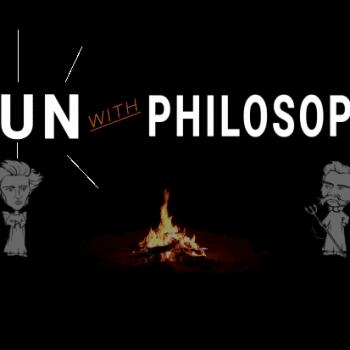In the Kingdom of Man, I argued that one of the most significant factors contributing to the turn towards white Christian Nationalism within conservative Evangelicalism is its foundation in Christian Idealism. Essentially, theologians became swept up in the philosophical idealism that was inherited from Hegel and other idealists. When applied to theology, it attempted to construct a belief system that imagined God as one who could never escape the dialectic of human perception. Ultimately, this presented Christianity in terms of ethics, creating an ideal framework that no human could ever achieve.
From here, it was simply a matter of constructing systems of theology with the doctrine of inerrancy at its foundation (the (un)scientific method of evangelical theology). This was all based on the idealistic premise that the absolute was attainable for humans. This resulted in a plethora of theologies throughout the 20th century, all claiming to be one step closer to the absolute.
In the meantime, in the pew, Joe Christian is paying the consequence because now he thinks following Jesus means becoming as close as possible to perfect. As long as he follows the “rules” of belief, he can not only get to heaven but also help bring heaven to Earth (in the case of dispensationalism).
The question, as it relates to politics and the contemporary evangelical movement, has been, Why is there such fervor on the part of evangelicals towards their main political issues. Why is Joe Christian so deeply convicted about issues that are largely minor or irrelevant from those discussed in the Bible and throughout Church history? And, at the same time, the seemingly important issues are largely ignored or, worse yet, legislated against.
The Kingdom of Man put forth a solid theory, which won’t be re-stated here. However, there is one aspect that was not discussed and might also be a contributing factor. In addition to the subliminalism theory set forth in the book, I am adding the theory of the false self.
The False Self
Donald Winnicott (1896-1971), a British psychoanalyst, developed the idea of the dichotomous self. Although much of his work was applied to infants, in recent years, there have been some applications for adults that explain certain behaviors.
The false self is a defense mechanism for protecting the individual’s true self. It oftentimes begins in childhood as a response to unmet emotional needs. We begin to look around us and notice that the groups we want to be a part of act differently than we think is appropriate or normal. However, our desire to be a part of the group outweighs how we feel internally. We then create various masks depending on our environment that hide our true selves. By the time we become adults, our false self is dominant.
David Benner, a brilliant depth psychologist, has also described this phenomenon in his book, The Gift of Being Yourself (a must-read by the way). Benner states:
“Our False self is built on an inordinate attachment to an image of our self that we think makes us special.”
Benner goes on to say that this has the opposite effect because it results in us sacrificing our uniqueness for acceptance; our self for the sake of the group. This is not only fair for those who deny their true selves but for those around them as well. The unintended consequences are adopting the will of the group over the Will of God. If we are willing to sacrifice our very selves simply for acceptance, why would we ever accept what God desires above the group?
Are you a Saul or a Paul?
Benner goes on to give a brilliant example of this in the Bible by using Paul’s conversion. Even though many of us think we are Paul, the reality is that many of us are actually Saul.
Saul – The False Self
Saul was a brilliant, highly educated young Pharisee. He was born that way. He was born with the ambition and drive to make the arduous journey through his pristine education. These were God-given talents and abilities.
In Saul’s mind, he was doing the Will of God. He had followed the Torah as instructed since he was a child. He memorized Scripture and went through the training to attain what he perceived to be his calling. As he states, he was a Pharisee of Pharisees.
At some point, he became overly zealous for the faith and became involved in the persecution of early Christians. Like many of his colleagues, his true self was overridden by the desire to be accepted as part of the group. This is how he could justify killing other people. Saul believed in doing so, he was doing the Will of God.
Paul – The True Self
At some point, Saul hit his head after seeing a vision from God, and something changed. Saul’s desire to be a part of the group was replaced by something deeper. There was something about his encounter with Jesus that made his true self reappear. He was transformed into Paul. How could such an encounter change this type of person so instantly? Luckily, he had 3 days to figure out what happened. 3 days to reorient himself to what he perceived as an encounter with Jesus.
Encountering Jesus
Not everyone who encountered Jesus had the type of epiphany that Paul had. In fact, most did not. Many of us are under the misguided impression that following Jesus or being like Jesus means taking on his life as our own. This idea has done a lot of damage to people of faith. Surrendering our deepest self to replicate some other self does not honor God and is the height of hubris.
Instead, God gave us all unique personalities, which are necessary to express all of our diversity. The lack of diversity within the Church is precisely the problem with the Church within our culture. Since so many Christians are willing to sacrifice their uniqueness for conformity, it’s no wonder that the Church lacks diversity as well as the desire for it. To welcome diversity would be to welcome discomfort and the possibility of disagreement.
There are many pastor’s all over the country who indoctrinate their congregations, having them sacrifice their own selves to accept the church or pastor’s identity. Instead of encouraging diverse thinking, they train their people to toe the line. And when people begin to ask questions, they are ostracized by the group. This is how these churches keep their people obedient. Remember, questions are contagious, which is why they are discouraged in many churches.
Perhaps Dallas Willard was right, we should consider replacing the question of What Would Jesus Do, with the question What Would Jesus Do If He Were Me?
You can view my UNenlightenment YouTube Channel HERE
You can view my UNenlightenment Podcast HERE
You can follow me on FaceBook HERE
Transform your life today by getting my book UNenlightenment HERE
Purchase my newest book The Kingdom of Man HERE















